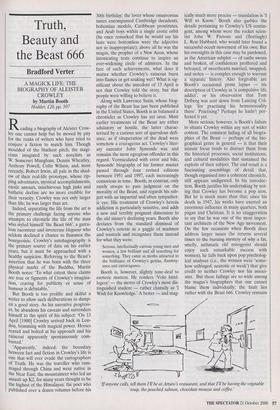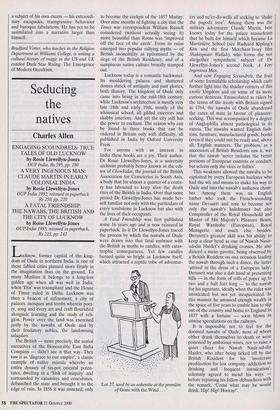Truth, Beauty and the Beast 666
Bradford Verter
A MAGICK LIFE: THE BIOGRAPHY OF ALEISTER CROWLEY by Martin Booth Hodder, £20, pp. 507 Reading a biography of Aleister Crow- ley one cannot help but be moved by pity for the ranks of writers who have tried to conjure a fiction to match him. Though moulded of the blackest pitch, the magi- cians imagined by such novelists as W. Somerset Maugham, Dennis Wheatley, Anthony Powell, Colin Wilson, and, most recently, Robert Irwin, all pale in the shad- ow of their real-life prototype, whose rip- ping adventures, mystical accomplishments, exotic amours, mischievous high jinks and bathetic decline are no more credible for their veracity. Crowley was not only larger than life; he was larger than art.
Indeed, separating the life from the art is the primary challenge facing anyone who attempts to chronicle the life of the man who styled himself 'the Beast 666', a garru- lous raconteur and inveterate blagueur who seldom declined a chance to flummox the bourgeoisie. Crowley's autohagiography is the primary source of data on his earlier Years, but it must be approached with a healthy suspicion. Referring to the Beast's assertion that he was born with the three physical marks of the Buddha, Martin Booth notes: 'To what extent these claims are true or figments of Crowley's imagina- tion, craving for publicity or sense of humour is debatable.'
But Booth is too prolific and skilful a writer to allow such deliberations to damp- en a good story. As his narrative progress- es, he abandons his caveats and surrenders himself to the spirit of his subject: 'On 13 April [1900] Crowley arrived back in Lon- don, brimming with magical power. Horses reared and bolted at his approach and his raincoat apparently spontaneously corn- busted.'
`Apparently,' indeed: the boundary between fact and fiction in Crowley's life is one that will ever evade the cartographers of Truth. He was the traveller who rum- maged through China and went native in the Near East; the mountaineer who led an assault up K2, for many years thought to be the highest of the Himalayas; the poet who published over a dozen volumes before his 30th birthday; the lover whose omnivorous tastes encompassed Cambridge decadents, bohemian models, Caribbean prostitutes, and Arab boys within a single erotic orbit (he once remarked that he would say his lusts were bottomless were the adjective not so inappropriate); above all he was the magus, the prophet of a New Aeon, whose intoxicating texts continue to inspire an ever-widening circle of admirers. In the face of such achievements, what does it matter whether Crowley's raincoat burst into flames or got soaking wet? What is sig- nificant about the anecdote of 13 April is not that Crowley told the story, but that people were willing to believe it.
Along with Lawrence Sutin, whose biog- raphy of the Beast has just been published in the United States, Booth is as balanced a chronicler as Crowley has yet seen. Most earlier treatments of the Beast are either adulatory or hostile, the latter charac- terised by a curious sort of querulous defi- ance, as if vituperation of the dead were somehow a courageous act. Crowley's liter- ary executor John Symonds was and remains the most egregious offender in this regard. Vermiculated with error and bile, Symonds' biography of his former master passed through four revised editions between 1951 and 1997, each increasingly censorious in tone. Booth, in contrast, only rarely stoops to pass judgment on the morality of the Beast, and regards his sub- ject with an impartial and often sympathet- ic eye. His treatment of Crowley's heroin addiction is particularly sensitive, and adds a new and terribly poignant dimension to the old sinner's declining years. Booth also deviates from the standard dismissal of Crowley's coterie as a gaggle of madmen and wastrels and recognises them instead for what they were:
Serious, intellectually curious young men and women, a few brilliant and all searching for something. They came as moths attracted to the brilliance of Crowley's genius, flamboy- ance and extravagance.
Booth is, however, slightly tone-deaf to esoteric matters. He renders 'Vol° Intel- legere' — the motto of Crowley's most dis- tinguished student — rather clumsily as 'I Wish for Knowledge.' A better — and mag- ically much more precise — translation is 'I Will to Know.' Booth also garbles the details pertaining to Crowley's US contin- gent, among whom were the rocket scien- tist John W. Parsons and (fleetingly) L. Ron Hubbard, who would later found a successful occult movement of his own. But his oversights in this case may be pardoned, as the American subplot — of oaths sworn and broken, of confidences proffered and betrayed, of sweethearts married, swapped, and stolen — is complex enough to warrant a separate history. Also forgivable are Booth's occasional prose lapses — his description of Crowley as 'a compulsive life addict', or his observation that Tom Driberg was sent down from Lancing Col- lege 'for practising his homosexuality there'. Practising? Perhaps he hadn't per- fected it yet.
More serious, however, is Booth's failure to situate Crowley within any sort of wider context. The common failing of all biogra- phies of the Beast — perhaps of the bio- graphical genre in general — is that their minute focus tends to distract them from the historical processes, social institutions, and cultural modalities that sustained the exploits of their subject. The end result is a fascinating assemblage of detail that, though organised into a coherent chronicle, still appears undigested. In his introduc- tion, Booth justifies his undertaking by not- ing that Crowley has become a pop icon. But he is much more than that; since his death in 1947, his works have exerted an enormous influence in many quarters, both pagan and Christian. It is no exaggeration to say that he was one of the most impor- tant architects of the New Age movement. On the few occasions when Booth does address larger issues (he returns several times to the burning mystery of why a fat, smelly, asthmatic old misogynist should enjoy such remarkable success with women), he falls back upon pop psycholog- ical analyses (i.e., the women were 'some- how unhinged, neurotic or weak') that give credit to neither Crowley nor his associ- ates. But these failings are so wide among the magus's biographers that one cannot blame them individually; the fault lies rather with the Beast 666. Crowley remains 'If anyone calls, tell them I'll be at Arturo's restaurant, and that I'll be having the vegetable soup, the poached salmon, chocolate mousse and coffee.' a subject of his own excess — his extraordi- nary escapades, transgressive behaviour and baroque fabulations. He has yet to be assimilated into a narrative larger than himself.
Bradford Verter, who teaches in the Religion Department at Williams College, is writing a cultural history of magic in the US and UK entitled Dark Star Rising: The Emergence of Modern Occultism.


























































































 Previous page
Previous page